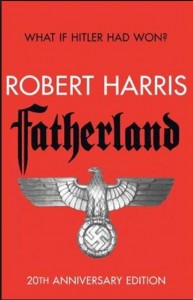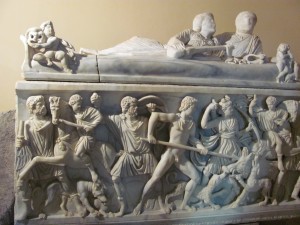 Basically, alternate history is a type of speculative fiction where stories are set in a world where historical events have unfolded differently from the way they did in the real world.
Basically, alternate history is a type of speculative fiction where stories are set in a world where historical events have unfolded differently from the way they did in the real world.
The event that changed history (point of divergence or PoD) must be in the past from when the story is set and have affected the present in such a way that it can part-resemble our timeline or be very different. Sometimes there are actual historical characters, sometimes entirely fictional ones or a mixture of both.
 Although there’s a lot of it about and modern favourites of mine include Robert Harris’s Fatherland, Keith Roberts’ Pavane and C J Sansom’s Dominion, it’s nothing new. Roman historian Livy suggests that the Romans would have beaten Alexander the Great if he had lived longer and had turned west to attack the Romans (Book IX, sections 17-19 Ab urbe condita libri (The History of Rome), Titus Livius).
Although there’s a lot of it about and modern favourites of mine include Robert Harris’s Fatherland, Keith Roberts’ Pavane and C J Sansom’s Dominion, it’s nothing new. Roman historian Livy suggests that the Romans would have beaten Alexander the Great if he had lived longer and had turned west to attack the Romans (Book IX, sections 17-19 Ab urbe condita libri (The History of Rome), Titus Livius).
Louis Geoffroy’s Histoire de la Monarchie universelle: Napoléon et la conquête du monde (1812–1832) (History of the Universal Monarchy: Napoleon And The Conquest Of The World) (1836) imagines Napoleon‘s French Empire victorious in its invasion of Russia in 1811 and England in 1814, later unifying the world under Bonaparte’s rule.
But how plausible is alternate history?
I’m very grateful to TV Tropes for dissecting and qualifying the main types so clearly on the sliding scale of alternate history plausibility, and I’ll use their categories to explain in more detail.
 Like science fiction, alternate history varies in ‘hardness’ with readers and fans grading it by how plausible the alternation is measured against historical reality.
Like science fiction, alternate history varies in ‘hardness’ with readers and fans grading it by how plausible the alternation is measured against historical reality.
At the ‘hard’ end are well-researched pieces that take into account historical sources and trends, logical changes due, for instance, to the butterfly effect, and try to relate events that flow logically from the point of divergence. At the ‘soft’ end are works of pure fantasy and ‘Rule of Cool’ (the level of ‘awesomeness’), generally a result of alien space bats (more classically, the dei ex machina).
Type I – Hard Alternate History: These are works that stick to strict, sometimes scientific, standards in their plausibility. Research is often detailed and intensive. Most historical counter-factuals fall into this category.
Type II – Hard/Soft Alternate History: Often well researched with historical logic and methodology, but allows room for adventurous outcomes or Rule of Drama/Cool/Comedy (sound familiar?)
Type III – Soft Alternate History: Here, setting up a world that fits the writer’s creative objectives is more important than the plausibility of the setting’s alternate history. Research is often minimal to moderate and plausibility will take a back seat to Rule of Drama/Cool/Comedy.
Type IV – Utterly Implausible Alternate History: These are works that are so ‘soft’ that they melt and so implausible as to be effectively impossible. Often, the author puts their own ideology to the fore at the expense of research, historic details or sensible logistics. Readers with even a passing familiarity with history can’t take it seriously. The original term alien space bats was coined to refer to this level of implausibility.
 Type X – Fantastical Alternate History: In contrast with Type IV, these works are deliberately designed as pure fantasy, typically following the Rule of Cool. Mad ideas prevail such as Nazis on the moon in the 2012 film Iron Sky.
Type X – Fantastical Alternate History: In contrast with Type IV, these works are deliberately designed as pure fantasy, typically following the Rule of Cool. Mad ideas prevail such as Nazis on the moon in the 2012 film Iron Sky.
Perception is, of course, subjective and depends upon the individual reader’s personal interpretations or on whether they are looking for serious historically logic development, a lighthearted, if not positively wacky, adventure story or something along the scale in-between. But no amount of plausibility, research or attention to ‘the rules’ or sense of fun will disguise poor writing, shallow characterisation and losing the plot.
Alison Morton is the author of Roma Nova thrillers – INCEPTIO, CARINA (novella), PERFIDITAS, SUCCESSIO, AURELIA, NEXUS (novella), INSURRECTIO and RETALIO, and ROMA NOVA EXTRA, a collection of short stories. Audiobooks are available for four of the series. Double Identity, a contemporary conspiracy, starts a new series of thrillers.
Download ‘Welcome to Alison Morton’s Thriller Worlds’, a FREE eBook, as a thank you gift when you sign up to Alison’s monthly email newsletter. You’ll also be among the first to know about news and book progress before everybody else, and take part in giveaways.













